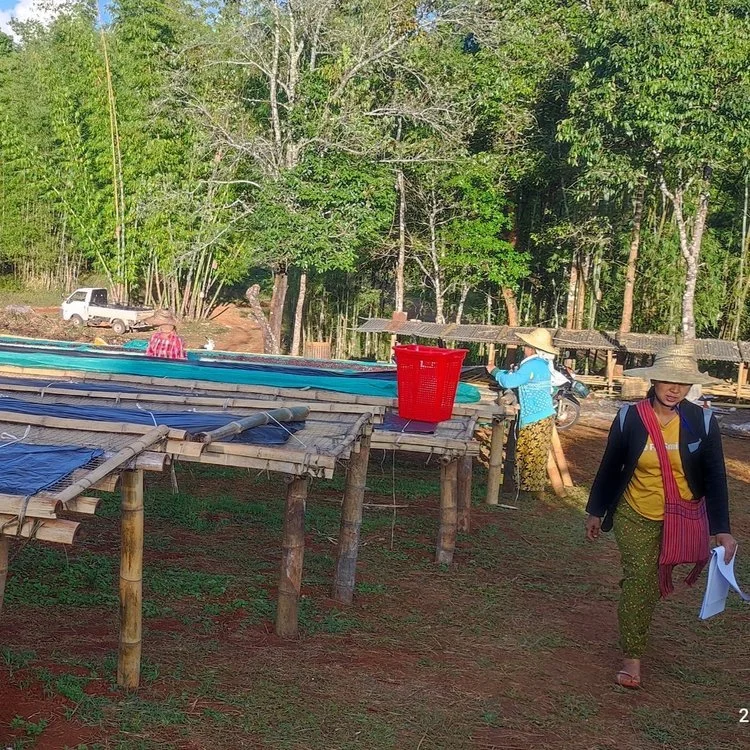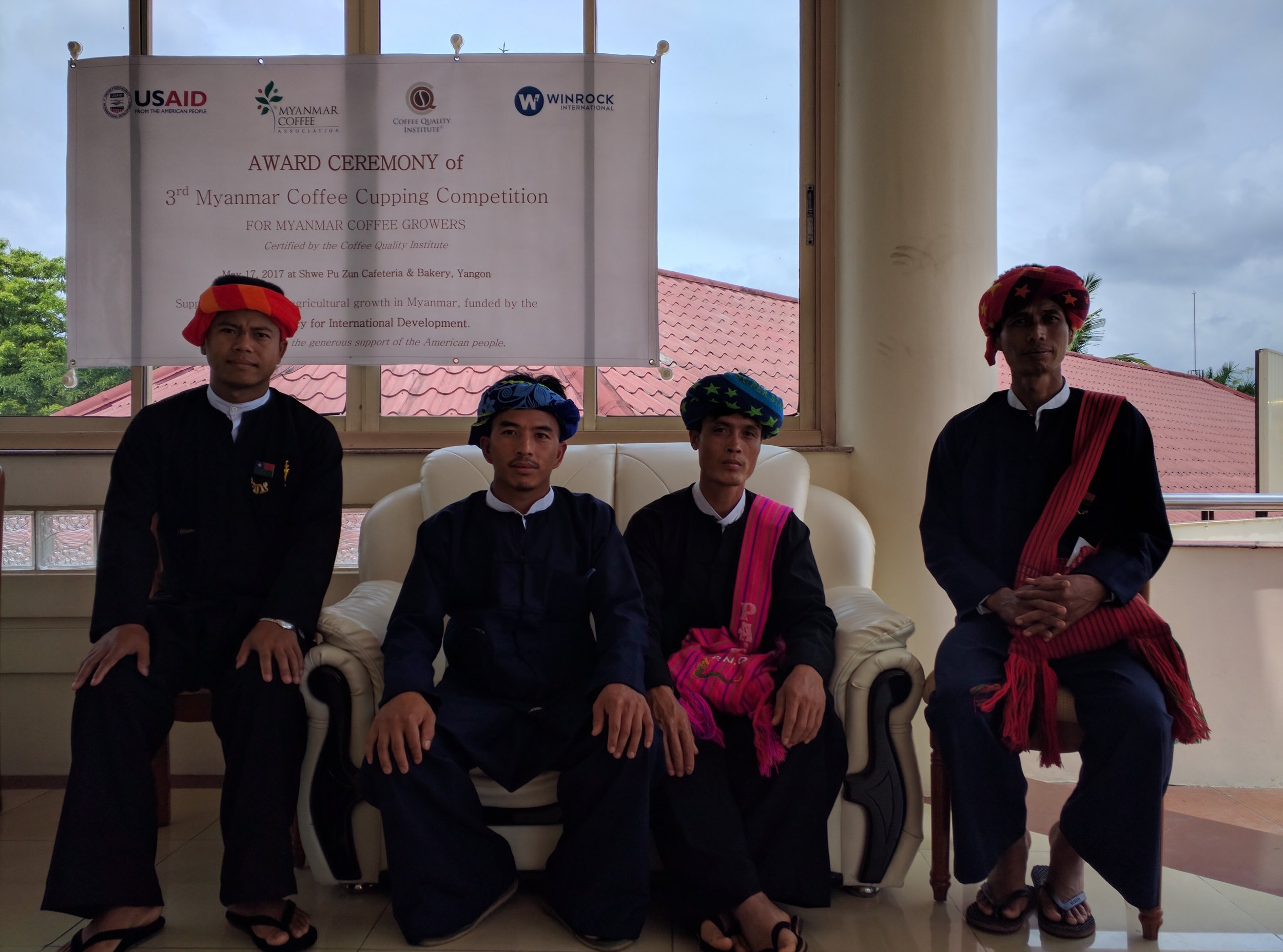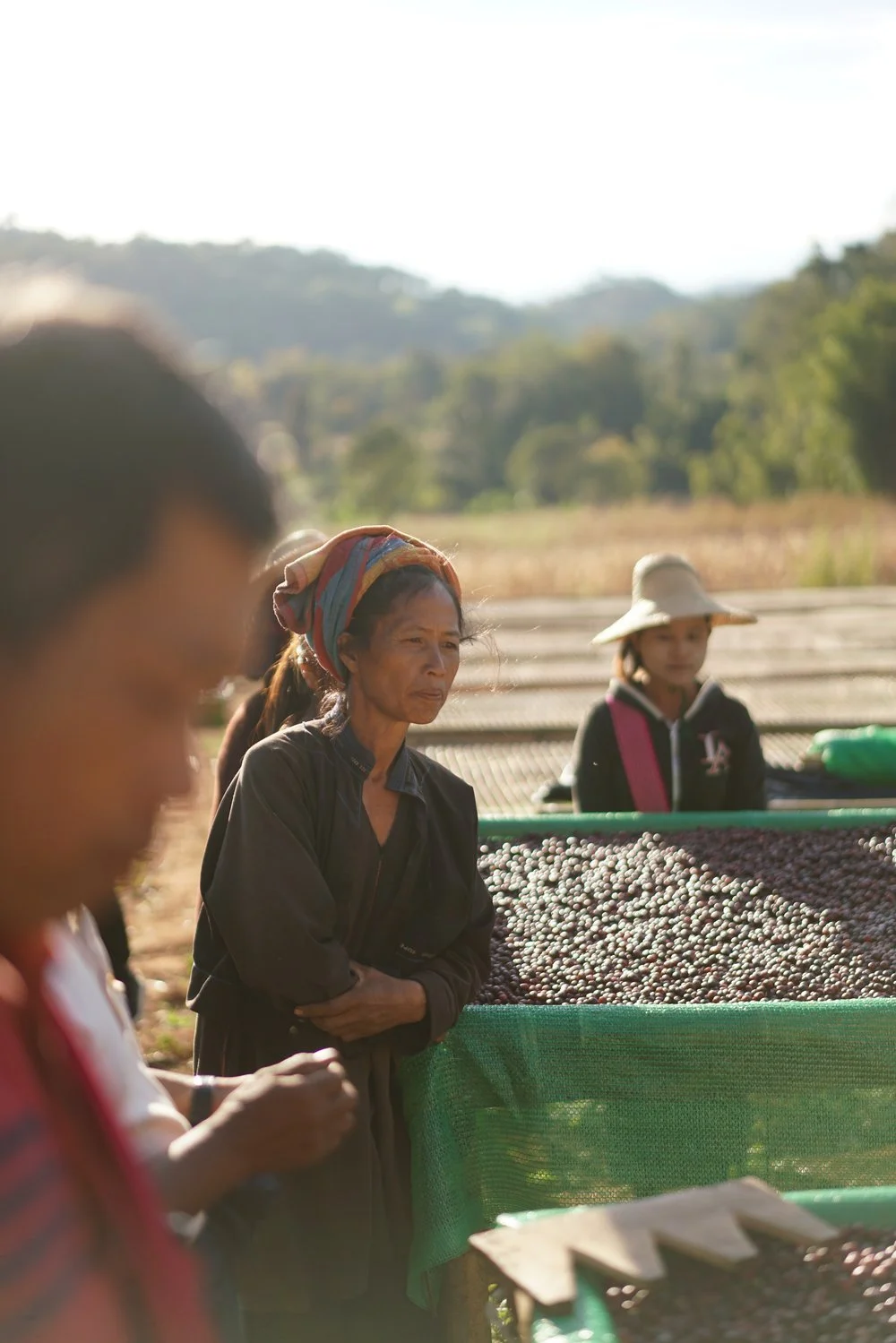Your personal Asian coffee passport
Your coffee: Myanmar Hopong Phar Moon
STATION: Phar Moon
LOCATION: Hopong, Myanmar
CULTIVARS: Arabica S – 795, Catimor, Caturra, Catuai, Bourbon
EXPORTER: Indigo Mountain
IMPORTER: This Side Up Coffees
ROASTER: Special Roast
Speciality coffee as a tool for community upliftment
In Hopong, hope comes in the form of coffee. An opportunity for many farmers to leave poppy farming. The harvesting of this controversial flower forces a way of living that is not only exhausting, but dangerous and extremely stressful. Coffee, on the other hand, is a project that becomes theirs. Farmers can see their trees grow and evolve; they own long-term projects, and, given the positive results over the past 10 years, securing a future for their families becomes palpable. After the UNODC spread the initial effort in eradicating poppy in 2014, Khun Saw Tun Aung and Khun Win Maung sought the resources to make their coffee better to get a better price, and sell it to the international market. Indigo mountain has 4 key areas of impact which are helping farmers earn a reliable income, technical assistance, convincing farmers to grow coffee instead of illicit crops which also aids in improving the ecological systems and lastly finding climate innovative solutions that will help them become more resilient in the face of unpredictable climate change. Indigo Mountain and it's partners have been able to actively use coffee as a tool to create positive change to their livelihoods.
coffee specs
what to taste for
Aroma: dried berries, flowers
Body: thick, stone fruit and floral
Acidity: gentle and rounded
Aftertaste: citric with bakers chocolate
PROCESSING your coffee
Sun dried natural process: Cherries are hand picked by Hopong community members in the early hours of the day. Once collection is finished, members deliver cherries to Hopong drying stations. On delivery, cherries are screened and handpicked to about 95% cherry ripeness level. Fully ripe cherries are then placed on raised beds. Slow drying is a priority and drying times range between 13-17 days depending on weather conditions. All lots are separated by day and all members’ deliveries are fully traceable.
ROASTING YOUR COFFEE
Special Roast uses a 22kg Probat UG22 roaster, that has been built in 1965. The roast time is 10 minutes. After the first crack, the coffee is roasted for a remainder of 25% of the time.
Relative PRICE BREAKDOWN
62%
The price Indigo Mountain pays farmers for their dried cherries as p/kg price of green (milled) coffee. This includes a premium we pay Indigo Mountain to reward the supreme quality they produce. This is invested in quality training for new members, roads and drying facilities.
18%
Amayar (dry mill) costs incurred: milling and packaging, local logistics from farm to mill/ from mill to port of Yangon, local taxes; quality control and marketing. They are also responsable for other things, such as picking up parchment on each village.
6%
International shipping, customs, insurance, local haulage from the port of Rotterdam and offloading in our warehouse.
14%
Importing, financing, shipping bureaucracy, sampling and financing costs for This Side Up Coffees.
Background of this coffee in the Netherlands
Hopong is a township located in Taunggy District in Southern Shan State. It is a part of a self-administered zone led by the Pa-O ethnic group. It has been growing coffee for many decades but production has been unstable. Cherry prices are very low and most farmers are not interested in coffee farming. Cheroot leaf –used to produce cigars – is another cash crop available in the area. But again, prices are not attractive to farmers. Since both coffee and cheroot leaf haven’t been profitable, most farmers focus on growing poppy – a flower whose sap is used to produce opium. Poppy production is not legal in Myanmar.
While cheroot has very high production costs and low margins, poppy has very high profit margins, but it’s incredibly risky. Besides exposing farmers to all sorts of dangers, such as exploitation and manipulation from powerful and wealthy drug lords, farmers become targets of government led expeditions to eradicate poppy farms. In many ways, farmers are caught in between power and money dynamics. This is why many farmers hide the poppy they harvest and wait. When the opportunity to sell it to brokers arrives, the meetings are arranged and transactions occur.
Coffee in Hopong
Hopong communities learnt about specialty coffee through a program hosted by the UNODC in 2014, in alliance with the then government this program aimed to offer "inclusive agricultural growth and systemic transformation of Myanmar's agriculture sector". Amongst other things, this program aimed to offer an alternative to poppy, though coffee. This program brought coffee to some regions for the first time, and with close examination and follow up, many farmers discovered the benefits of coffee and gradually started to shift from poppy. However, once the program was concluded, the coffee was sold at a very low price to Thailand. Members from Bant Sawk recurred on social media to learn more about specialty coffee and improve their practices. They wanted to learn from neighbouring communities that were already producing speciality sun-dried natural coffee; they wanted to get a better price for their coffee, and they knew they could.
At some point members of the soon to be Indigo Mountain, and community members of Bant Sawk, contacted Winrock International (NGO running specialty coffee production in the area) where Khun Ko Chu Min Tai then worked offering technical assistance to farmers seeking to improve their quality. However, due to limited scope and funding, Winrock could not fully accommodate their request, but managed to arrange a 2 week peer-to-peer training. Leaders from Hopong stayed in one of the specialty coffee producing communities to learn the tricks of the trade. After this training, they produced their very first six bags of sun dried natural coffee and soon after agronomist Khun Ko Chu Min left his job at Winrock and decided to join the organisation in 2019.
The name Phar Moon
Around 300 years ago, a family that lived in The Hton, Mon State, was forced to quickly abandon their homes after their leader was arrested. This one family established in what is now Phar Moon. It is said that after a year of living in this village, they found a place where many cotton plants grew. These plants are called Phar Moon in Pa O language.

















